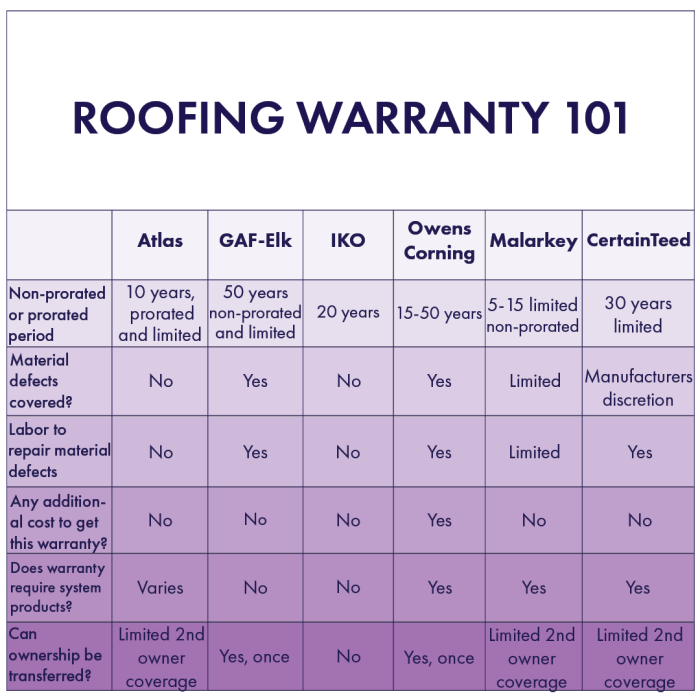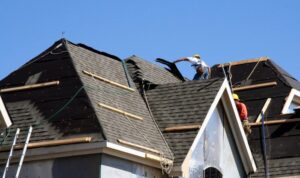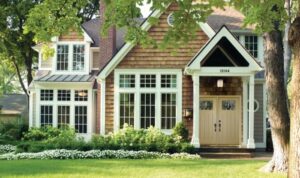Exploring the world of roofing warranty options, this article aims to provide a detailed overview of the different types of warranties available, key factors to consider when choosing one, common exclusions to watch out for, and more. Whether you're a homeowner looking to protect your investment or a contractor navigating warranty choices, this guide has you covered.
Types of Roofing Warranties
Roofing warranties come in various types, each offering different levels of coverage and protection for your roof. It's essential to understand the differences between manufacturer warranties and contractor warranties to make an informed decision when investing in a new roof.
Manufacturer Warranties
Manufacturer warranties are provided by the company that produces the roofing materials. These warranties typically cover defects in the materials themselves, such as premature deterioration, manufacturing flaws, or damage caused during transportation. Manufacturer warranties can range from 10 years to a lifetime, depending on the quality of the materials used.
Contractor Warranties
Contractor warranties, on the other hand, are offered by the roofing contractor who installs the roof. These warranties cover the workmanship and installation of the roof, ensuring that it is done correctly and up to industry standards. Contractor warranties may range from 1 year to 10 years, depending on the contractor and the scope of work.
Comparison
Manufacturer warranties focus on the materials used in the roof, while contractor warranties ensure the quality of the installation. It's important to have both types of warranties to provide comprehensive coverage for your roof. If an issue arises, you may need to coordinate between the manufacturer and contractor to determine the cause of the problem and who is responsible for the repair or replacement.
Factors to Consider
When choosing a roofing warranty, there are several key factors to take into consideration to ensure you are selecting the best option for your needs. One of the most important aspects to look at is the length of the warranty and the coverage it provides.
A longer warranty period typically indicates that the manufacturer has confidence in the quality of their product, giving you peace of mind that your roof will be protected for an extended period of time. Additionally, the coverage offered by the warranty is crucial as it Artikels what types of damage or issues are included and excluded from the protection.
Importance of Warranty Length and Coverage
- Warranty Length: A longer warranty period signifies the durability and quality of the roofing materials. It ensures that you are covered for a longer duration, reducing the risk of unexpected expenses for repairs or replacements.
- Warranty Coverage: Understanding the extent of coverage provided by the warranty is essential. Make sure to review what is included, such as material defects, workmanship errors, and the duration of coverage for each type of issue.
Impact of Location and Climate on Warranty Options
- Location: The geographical location of your property can have a significant impact on the warranty options available to you. Certain warranties may have specific requirements or limitations based on the region, such as extreme weather conditions or environmental factors.
- Climate: The climate of your area plays a crucial role in determining the type of roofing warranty that would be most suitable. For instance, areas prone to heavy rainfall, snow, or high winds may require warranties that offer enhanced protection against water damage, ice dams, or wind uplift.
Common Warranty Exclusions

When it comes to roofing warranties, there are certain common exclusions that homeowners should be aware of to ensure they do not void their coverage. Improper installation and lack of maintenance can have a significant impact on the validity of a roofing warranty.
Improper Installation
Improper installation of roofing materials is a common exclusion in most warranties. If the roof is not installed according to the manufacturer's specifications or by a certified professional, the warranty may be voided. This is because improper installation can lead to premature wear and tear, leaks, and other issues that the warranty may not cover.
Lack of Maintenance
Another common exclusion in roofing warranties is the lack of proper maintenance. Failure to perform regular inspections, cleanings, and repairs can lead to accelerated deterioration of the roof
It is essential for homeowners to follow the recommended maintenance schedule to ensure their warranty remains valid.
Transferability and Length of Warranty
When it comes to roofing warranties, two key factors to consider are transferability and the length of the warranty. Transferable warranties and the duration of coverage can greatly impact the value and protection provided by the warranty.Transferable warranties allow the warranty to be transferred from one homeowner to another if the property is sold.
This can be a significant benefit for both the current homeowner, who can use it as a selling point, and the new homeowner, who will continue to be covered under the warranty. It adds value to the property and provides peace of mind to all parties involved.The length of a roofing warranty is also crucial.
The longer the warranty period, the more extended protection you have against potential issues with your roof. Manufacturers may offer warranty extensions, which are additional periods of coverage beyond the standard warranty length. These extensions can be purchased at an additional cost but provide added security and peace of mind.
Benefits of Transferable Warranties
Transferable warranties can increase the resale value of your home and provide assurance to potential buyers that the roof is covered. This can make your property more attractive in a competitive real estate market.
- Transferable warranties can be a selling point when putting your home on the market.
- They offer peace of mind to both the current and future homeowners.
Significance of Warranty Length
The length of a roofing warranty determines how long you are protected against defects or issues with your roof. Longer warranty periods mean more extended coverage and potentially fewer out-of-pocket expenses for repairs or replacements.
- Longer warranty periods provide more extended protection for your investment.
- Warranty extensions can be purchased to further lengthen the coverage beyond the standard warranty period.
Examples of Warranty Extensions
Warranty extensions are additional periods of coverage that can be added to your standard warranty for an extra fee. These extensions typically extend the coverage for a specific number of years beyond the original warranty length.
- A manufacturer may offer a 10-year warranty extension, providing a total of 30 years of coverage for your roof.
- Warranty extensions can be purchased at the time of installation or added later during the warranty period.
Conclusion
In conclusion, understanding the ins and outs of roofing warranty options is crucial in ensuring the longevity and protection of your roof. By weighing factors like coverage, length, and transferability, you can make an informed decision that suits your needs.
Stay informed, stay covered, and enjoy the peace of mind that comes with a reliable roofing warranty.
Quick FAQs
What are the different types of roofing warranties available?
Roofing warranties can vary from manufacturer warranties to contractor warranties, each offering different levels of coverage and protection.
How does improper installation impact a roofing warranty?
Improper installation can void a roofing warranty, emphasizing the importance of hiring qualified professionals for the job.
Are roofing warranties transferable?
Some roofing warranties are transferable, allowing the coverage to be passed on to a new homeowner if the property is sold.
What are common exclusions found in roofing warranties?
Common exclusions include damage from natural disasters, lack of maintenance, and pre-existing issues with the roof.
How does location and climate impact warranty options?
Location and climate can impact warranty options by influencing the type of coverage needed for specific environmental conditions.






